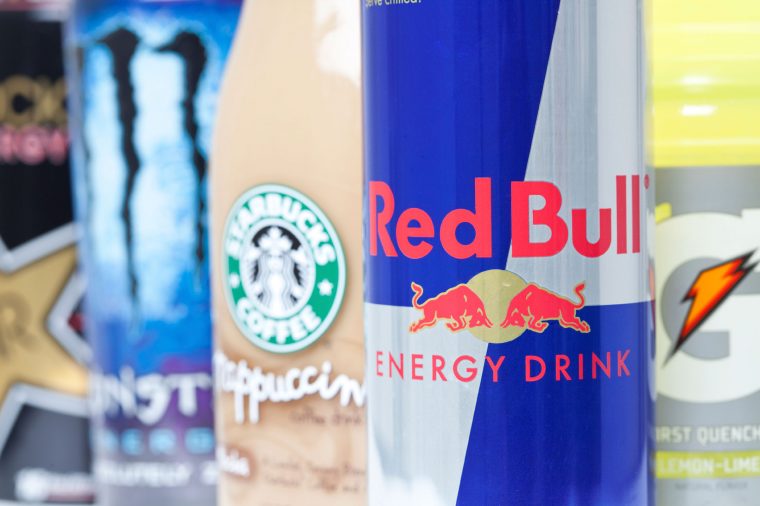
From a messy desk to ‘toxic’ friends, these surprising stamina robbers may be making you tired.
Your messy desk
Being surrounded by heaping piles of paper and junk—either on your desk or anywhere in your home—can shift your brain into overdrive and overload. Researchers from Princeton University asked volunteers to focus on one object and then moved another object into their view.
When object number two appeared, the investigators noticed a fuzzy version of that item pop up in the participants’ brain scans. Their conclusion: The more clutter in your living or working space, the more difficult it is for your brain to concentrate, causing it to get tired over time.
This theory applies to the kitchen too. According to a study conducted at Cornell University, a disorganized kitchen can add to stress levels and lead to unhealthy, high-calorie food choices.
Guzzling energy drinks
Wait, aren’t they supposed to spike your energy levels? Not quite. “Watch out for energy ‘loan shark’ drinks, including soda and fruit juices, because they are loaded with sugar,” says Jacob Teitelbaum, MD, author of The Fatigue and Fibromyalgia Solution.
“While they provide a quick energy boost, they take away twice as much by causing a drop in your blood sugar.” In fact, a recent study from Australia discovered that sugary drinks can affect the region of the brain that controls emotional behavior and cognitive function, and may be as damaging to the brain as extreme stress.
The way you walk
Body posture can have a direct effect on our stamina, as well as our feelings. An article published in the journal Biofeedback gathered 110 young adults and asked them to rate their energy levels and their general rate of depression.
They were then divided into two groups and instructed to walk either slouched over or with a spring in their step (by moving their arms and even skipping) for two to three minutes. Afterward, the adults with the more vibrant walk reported feeling more energetic, positive and happier, while the slouchers felt sad, sleepy, and zombie-like.
“What we’re saying is that if you start integrating more body movements into your daily life, your energy level stays higher and your quality of life is better,” said lead researcher Erik Peper, PhD, a professor at San Francisco State University. “It’s very similar to the principle of ‘fake it till you make it’—you can convince your body to have more energy.”
Not sipping enough H2O
Even being a little thirsty can alter your energy levels and emotions, according to researchers from the University of Connecticut’s Human Performance Laboratory. After testing groups of men and women in separate studies, they found that mild dehydration caused headaches, fatigue, and difficulty concentrating among women and difficulty with mental tasks, especially in areas of vigilance and working memory, among men.
“In both sexes, these adverse mood changes may limit the motivation required to engage in even moderate aerobic exercise,” says Harris Lieberman, one of the study’s co-authors. He also noted that mild dehydration may interfere with other types of daily activities.
A lack of this critical vitamin and mineral combo
“Not getting enough energy-making vitamins and minerals—especially B vitamins and magnesium—is a key energy zapper,” says Dr. Teitelbaum. One study conducted at Rush University Medical Center found that people with low levels of vitamin B12 were likely to have lower brain volumes and have issues with their thinking skills, while another published in the journal Neuron suggests that increasing magnesium intake may boost brainpower by enhancing learning and memory.
In his own research, Dr. Teitelbaum—who has published numerous studies on chronic fatigue syndrome—discovered that patients had a favorable reaction when mixing a vitamin B and magnesium powder with a ribose powder (a chemical that is the backbone of adenosine troposphere [ATP], the source for all cellular energy). “In two of our studies, this increased energy an astounding average of 61 percent after three weeks,” he says.
The people in your inner circle
It’s true—‘toxic friends’ are a thing. Associating with certain individuals can actually be exhausting, says Dr. Teitelbaum. “Friends and colleagues who are ‘energy vampires’ leave you feeling emotionally drained after speaking with them,” he explains.
And according to recent research from the University of Wisconsin, people tend to unconsciously mimic others’ facial expressions to create the same emotions—whether positive or negative—within themselves. “So if being around someone feels bad, the healthy answer is usually saying ‘no’ instead of ‘yes’,” adds Dr. Teitelbaum.

























